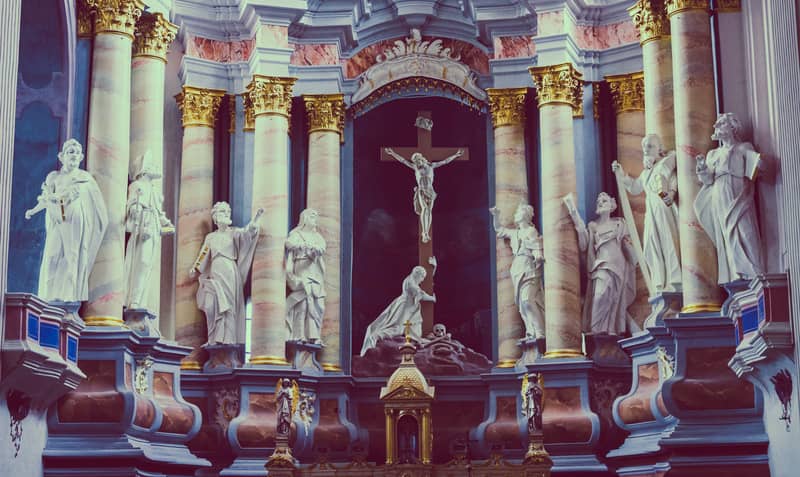The critics were right in many ways. Much, although not all, of the music at the pope's Mass was mediocre at best, selected by the well-meaning but tin-eared liturgical bureaucrats of the Archdiocese of Washington. I caught Benedict's slight eye-roll on the Jumbotron as he tried to sit politely through an instrumental interlude that consisted entirely of drum rolls and atonal brass. Even genuinely lovely offerings, such as world-class tenor Placido Domingo's world-class rendering of "Panis Angelicus" toward the end of the Mass, got submerged in the general bloat. It was also true that the multiplicity of languages in the liturgy was confusing rather than exhilarating, and that applause and shrieks of "woo-hoo!," accompanied by the waving of miniature Vatican flags from our goody bags, appropriately displayed our enthusiasm for the pontiff—but maybe not at communion time.
All this, however, is to miss the point, which is that the Catholics of Washington and its environs were trying their best to give something beautiful and valuable back to a pope whose arrival in Washington and willingness to preside, the day after his 81st birthday, over a gruelingly long liturgy in an athletic stadium were a gift to us. I had never seen a pope in the flesh in my life, and neither, I think, had many others in the stands, who had come by car, bus, and Metro train from all over Washington, southern Maryland, and as far away as Richmond, Va., winners of parish lotteries or given tickets by their pastors as rewards for volunteer service.
They started arriving as early as 5 in the morning, and by the time I got to Nationals Park, at 6:30 a.m., there was already a swelling crowd. It was a crowd that matched James Joyce's description of the Catholic Church as Here Comes Everybody: representatives of every ethnic and every age group, too, from the baby getting its diapers changed by its mother on a plaza to elderly ladies helping themselves along with walkers. Some of those folks were attired as if for an audience in the Vatican, wearing suits and ties or dark dresses; others had come in Crocs and clam-diggers. Catholic schoolgirls wore their uniforms of tiny plaid skirts and knee-socks; some college-age youths sported Goth-black T-shirts reading "Property of Benedict XVI." There were hundreds of priests in cassocks, nuns in old-fashioned habits with graceful veils and rosaries. It was a cheerful crowd, uncomplaining when the concession stands ran out of coffee by 7 a.m., patiently waiting in long lines to have confessions heard by a bevy of priests under a large pavilion set up just outside the stadium.
It was clear to me that most of those 46,000 people were neither saints nor liturgical aesthetes; many of them (including me) probably weren't even outstandingly pious. What they were was thrilled to be at there, thrilled to be Catholics, and thrilled to be anticipating their first-ever glimpse of a pope. A few days before, I had helped host an online chatroom in a webcast produced by our local Fox affiliate. I had expected hostile questions from disaffected chatters along the lines of "Why won't the Church ordain women?" and "What's wrong with gay marriage?" Instead, most of the questions were: "Is it too late for me to get a ticket to the Mass?" Some 100,000 people are reported to have tried.
Yes, Benedict has in writings has called for more "verticality" in the liturgy—more focus on its transcendent meaning as a reenactment of Christ's sacrifice—rather than the "horizontality" of a celebration of community. But there was in fact verticality aplenty at this Mass, supplied not least by Benedict himself, resplendent in flame-red vestments, awe-striking in his recitation of the sacred words of consecration, ineffably moving in his delivery of the sermon he had written just for us: "I have come to America to confirm you, my brothers and sisters, in the faith of the apostles."
When Benedict, preceded by a procession of priests and bishops, walked across the field to the altar to begin the Mass, the Jumbotron flashed close-ups of choir members weeping as they sang the opening hymns. My eyes filled with tears, too, when I heard him begin the liturgy, in his German-accented English, with the very first words I had ever heard said live by a pope: "Peace be with you." The vicar of Christ was speaking the words of Christ. After it was all over, the mood of the tens of thousands strolling out of the stadium into the brilliant spring sun was pure, if exhausted happiness. Every single one of us was a Catholic, baptized in our faith, and every single one of us had made a pilgrimage. What we brought wasn't perfect, and I'm the first to admit that American Catholics could use more of the liturgical sophistication that, as my conservative friends point out, we sorely lack, but this disparate group of imperfect people had given Benedict a gift that was whole-hearted if not always in the best of taste.

